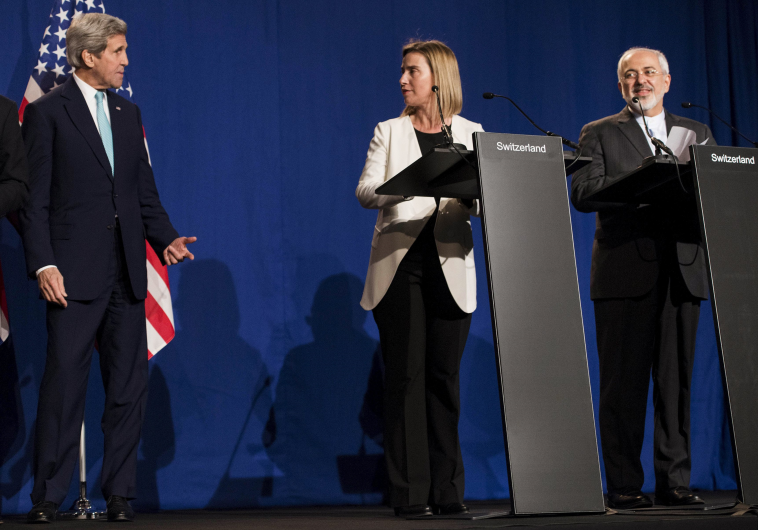US hails ‘historic’ nuclear deal with Iran
By MICHAEL WILNER/04/02/2015 /J.Post
LAUSANNE, Switzerland – World powers will terminate all sanctions on Iran in exchange for its commitment to cap and roll back its nuclear program, officials announced on Thursday after two years of negotiations. Hailed as a breakthrough by the United States, by the European Union and by Iran itself, Israel quickly criticized key tenets of the deal. But all parties agreed the moment was historic, for better or worse. Under the deal, cast as an “understanding” framing the parameters of a larger, more technical agreement due by June 30, Iran will be allowed to continue the enrichment of uranium and will close no facilities. “This deal is not based on trust,” US President Barack Obama said from the Rose Garden of the White House, declaring the framework would “cut off every pathway” Iran has before it could build a nuclear weapon. Announcing the deal, Western officials said that enrichment would continue on a “scope and schedule mutually agreed” at only the Natanz facility.
In total, Iran will reduce roughly two-thirds of its installed centrifuges to 6,104 machines, a cap set in place for a decade. The centrifuges allowed will be IR-1s, but research and development will continue into IR-4, IR-5 and IR-6 models. Iran’s enrichment of uranium will be capped at 3.67 percent for at least 15 years. For the same period, Iran will be prohibited from building any new enrichment facilities. In a fact sheet, the Obama administration stated these conditions will extend Iran’s “breakout” time – the amount of time required for Tehran to enrich enough weapons-grade material – to a single year. That year-long cap will be enforced for a decade.
Fordow – a nuclear facility covertly built over the last decade and burrowed inside a mountain – will be converted into a “nuclear physics, technology, research center,” also for a period of 15 years. The plant was originally built for the enrichment of uranium, but “no fissile material” will be allowed at the site, European Union high representative Federica Mogherini said at a press event at the Ecole Polytechnique Federale de Lausanne in Switzerland. And international inspectors will have access to Iran’s uranium ore mines and yellowcake-producing mills for 25 years, monitored through “continuous surveillance.”
“Today, we have taken a decisive step,” Mogherini said. “We can now restart drafting the text and annexes on the comprehensive plan of action.”Tehran will allow the United Nations International Atomic Energy Agency, tasked with monitoring the deal, to operate “advanced technology” within Iran to collect data on its nuclear work. Mogherini did not specify on the nature of those technologies. The IAEA will also be allowed to investigate “past and present” concerns while on the ground, she added. The IAEA’s ability to compel Iran to answer questions on its past nuclear weapons work is vaguely outlined: “Iran will implement an agreed set of measures to address the IAEA’s concerns regarding the possible military dimensions (PMD) of its program,” the US said in a press release.
But US Secretary of State John Kerry specified further that Iran has agreed to allow the IAEA access to “any site” suspected of conducting illicit covert activity, as well as “indefinite” access to the construction sites for its centrifuges. “The political understanding with details that we have reached is a solid foundation for the good deal we are seeking,” Kerry said in Lausanne, adding: “There will be no sunset” to the nuclear agreement. “No viable alternatives, not one, would be nearly as effective” in preventing Iran from acquiring nuclear weapons, Kerry added. He noted the Obama administration’s continuous briefing of Israel throughout two years of negotiations, and asserted that the agreement announced on Thursday would ensure the safety of the Jewish state.
Generally, world powers will be able to monitor most of Iran’s nuclear work for an average of a decade. And afterward, Iran has agreed to implement the Additional Protocol of the IAEA. Iran originally suspended its participation in those annexes in 2006. Many details of the agreement are expected to remain private. But more details were released than expected, after the Obama administration pushed for a technical-specific document to present to the US Congress.
“We’re still some time away from reaching where we want to be,” Iranian Foreign Minister Muhammad Javad Zarif said. Negotiations toward a final, comprehensive joint plan of action will continue until June 30. “We have decided to take steps for a period of time who assured anyone who had concerns.” At Arak, a facility which houses a heavy-water reactor that could produce weapons-grade plutonium material, “spent fuel will be exported” and the reactor redesigned to ensure its safe use. No new heavy-water reactors will be built for 15 years, Kerry noted. “None of those measures includes closing any of our facilities,” Zarif said. “We will continue enriching… our heavy-water reactor will be modernized. And Fordow will continue.”
“We have stopped a cycle that has not been in the interests of anybody,” Zarif added. In exchange, all UN Security Council sanctions will be eliminated “for a mutually agreed period of time,” Mogherini said, “if it verifiably abides by its commitments,” Washington added. In its prepared material, the Obama administration emphasized that UN sanctions relief would be tied to Iran’s participation on a host of matters, including “enrichment, Fordow, Arak, PMD, and transparency.” Iran has previously said that addressing the IAEA’s concerns with possible military dimensions to its nuclear work would require they prove a negative. The Islamic Republic has consistently denied any military nature to its nuclear program.
And “the architecture of US nuclear-related sanctions on Iran will be retained for much of the duration of the deal,” according to the White House, “and allow for snap-back of sanctions in the event of significant non-performance.”Kerry said that the “exact timing” of sanctions relief is still a matter of negotiation. From the documents immediately made available, the five permanent Security Council members at the table did not agree specifically on how they would handle any violations of a deal by Iran.
Broadly speaking, the group agreed that a “dispute resolution process will be specified,” enabling any of the signatories of a final agreement to seek to resolve disagreements through the yet-specified mechanism. “If an issue of significant non-performance cannot be resolved through that process,” the White House said, “then all previous UN sanctions could be reimposed.”
Throughout negotiations, Russia, a veto-wielding power on the Security Council, was opposed to a US-designed “snap back” mechanism which would automatically reimpose sanctions should Iran violate a deal. That mechanism would not require additional votes by the council. Negotiations here in the Swiss Alps lasted eight days, after two years of negotiations between Tehran and Washington, and after 13 years of talks, on and off, between Iran and Europe. “Today we have reached a critical milestone in that quest,” Kerry declared. For over a decade, world powers have sought to cap, restrict, monitor and partially roll back Iran’s nuclear work, in order to ensure that its program remains exclusively peaceful.
They have passed eight resolutions in the UN against Iran since 2006, cut off Iran from oil and exchange markets and subjected Iran to a host of other restrictions, cutting its government off from the international community. Over the course of a year, the US president has presented Iran with the prospect of an alternative path should it agree to a broad, invasive nuclear deal.
“Today, the United States, together with our allies and partners, has reached a historic understanding with Iran, which if fully implemented, will prevent it from obtaining a nuclear weapon,” Obama said. “If this framework leads to a final comprehensive deal, it will make our country, our allies and our world safer,” he said. The president said he had spoken to Saudi Arabia’s King Salman earlier on Thursday, and that would speak with Prime Minister Benjamin Netanyahu in the days to come.
“If Iran cheats,” Obama added, “the world will know it.”
















